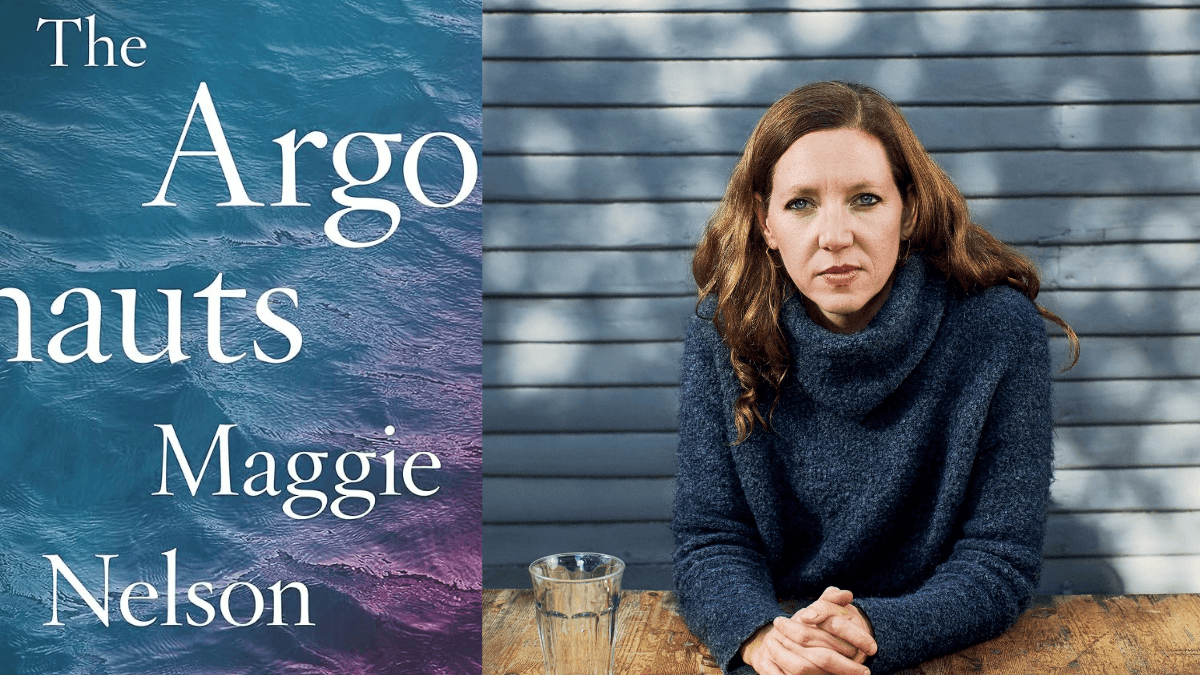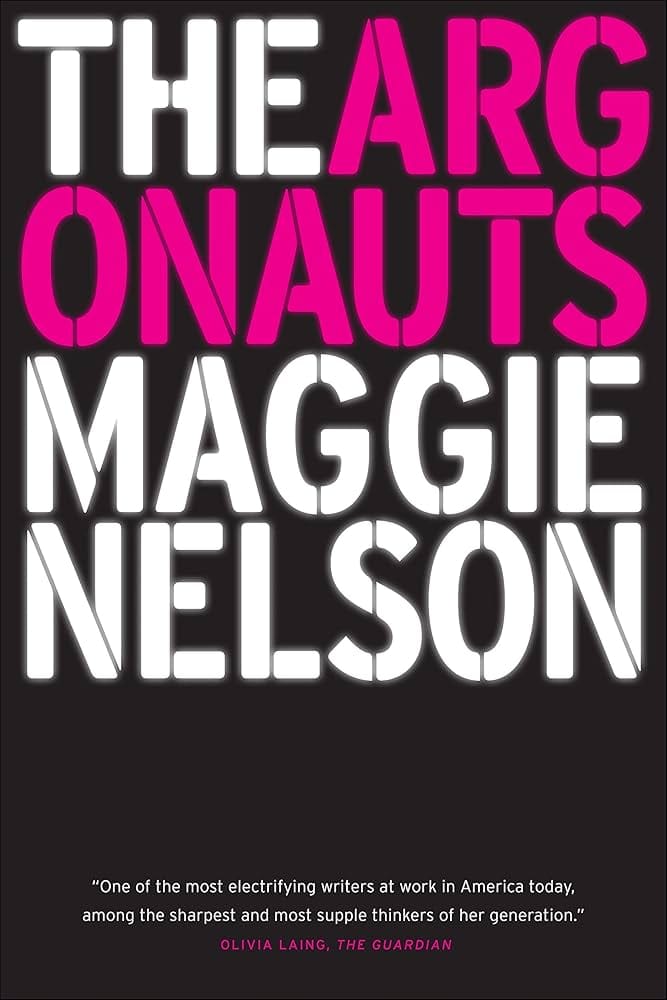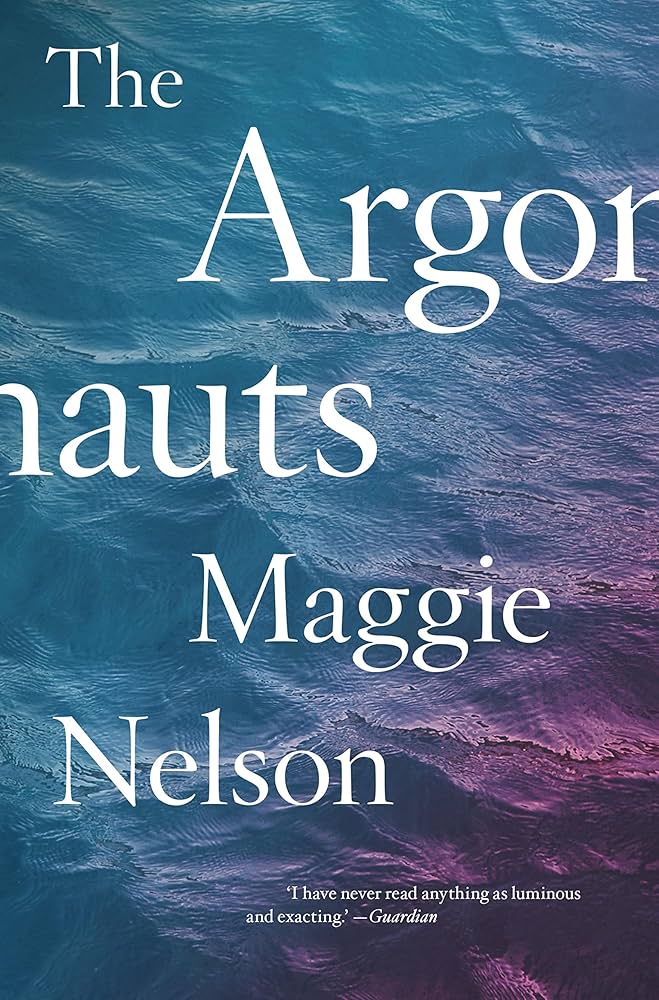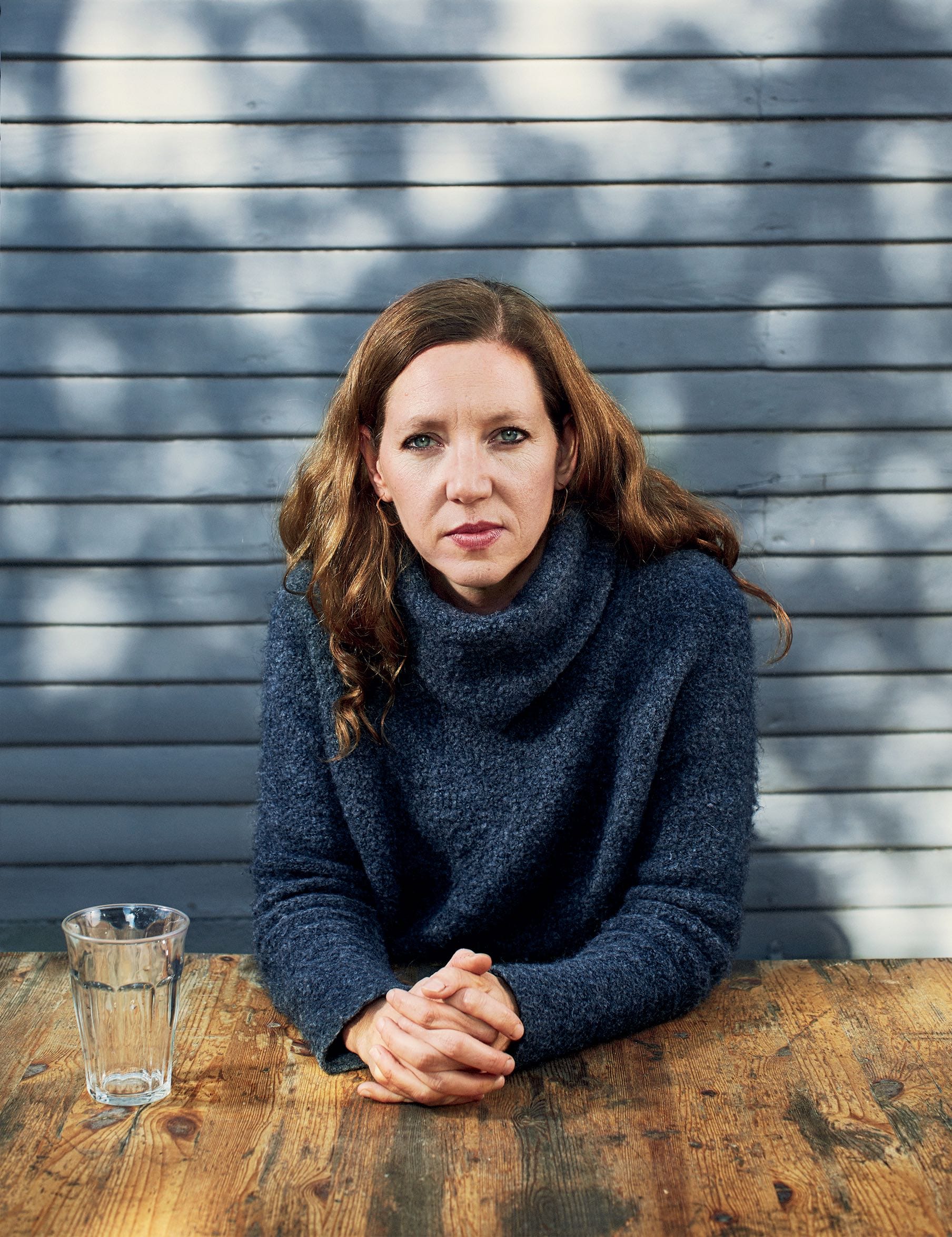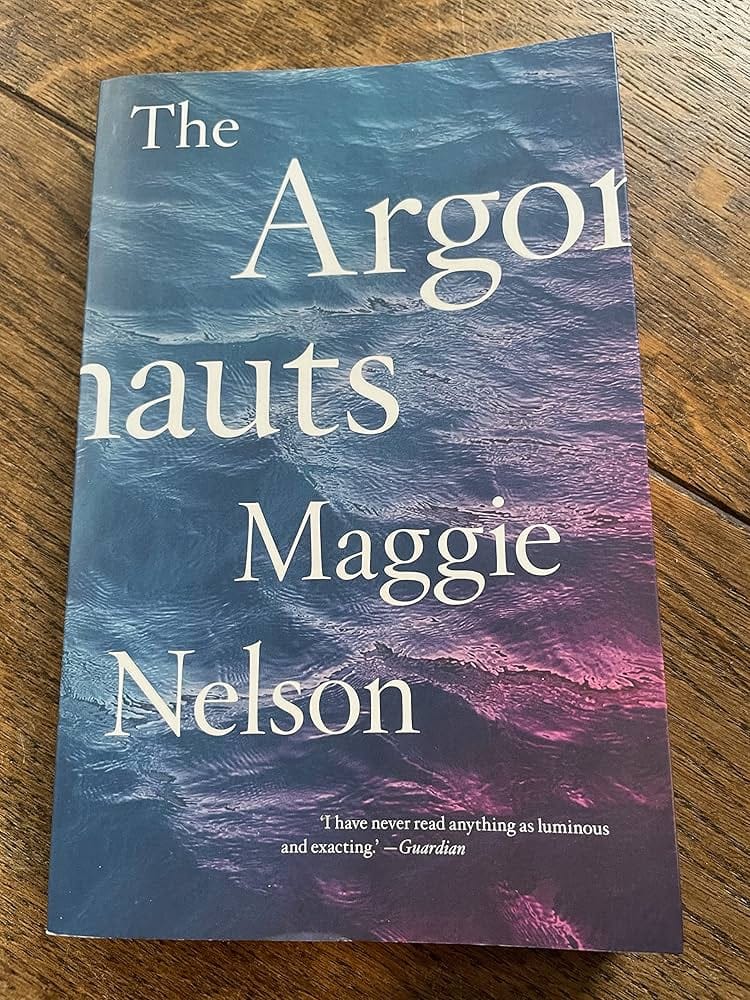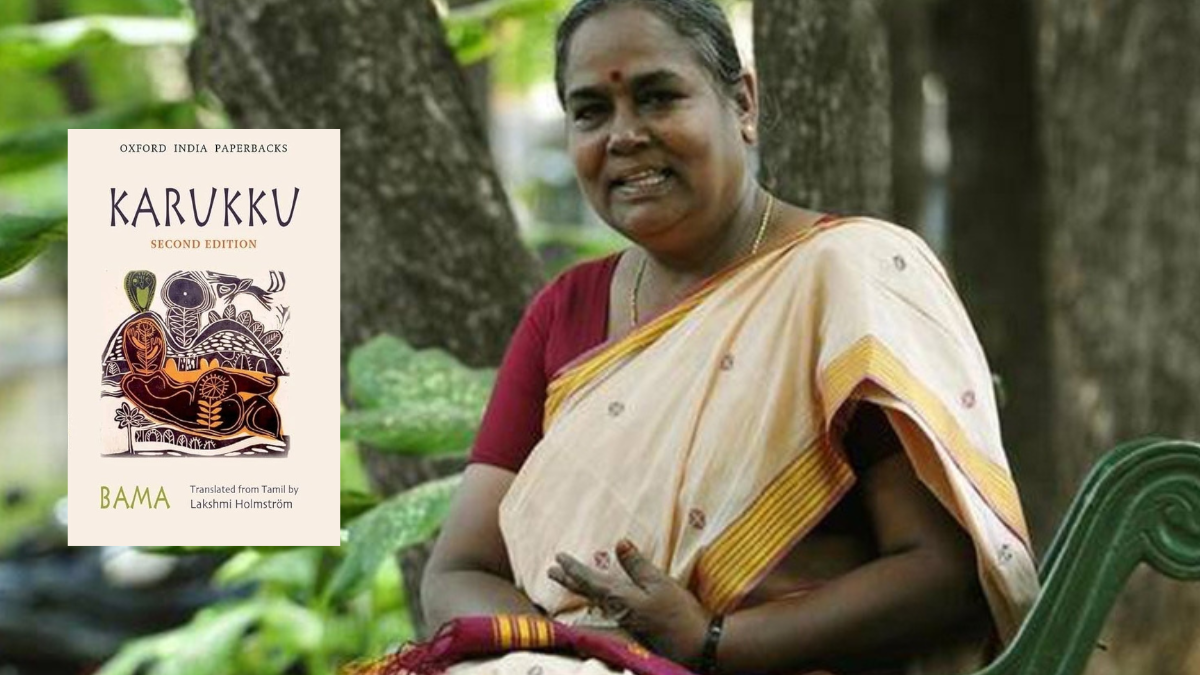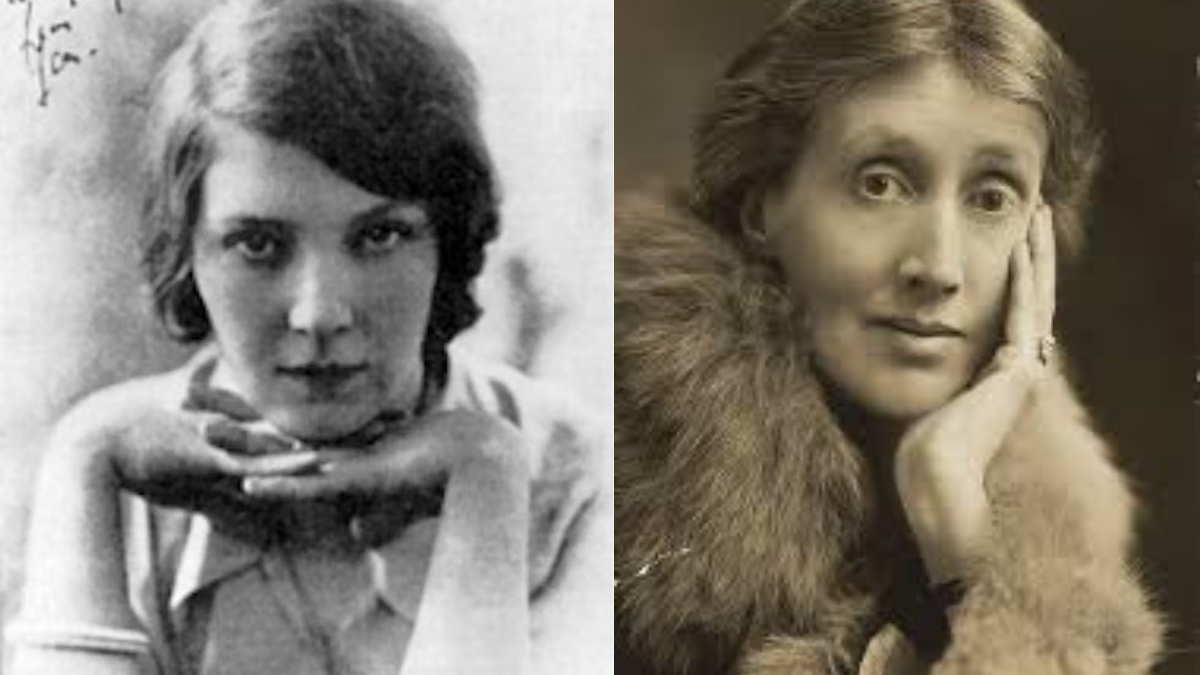Maggie Nelson’s The Argonauts is not a gentle pastel flowery tone to motherhood. It is not an Archie’s card and it is not a sweet little delicate story, it is a little bomb kept into a room full of conventional thought and when it has combusted , all you have are strange swirls of glittery thought.
By no means an ordinary read, Nelson weaves theory and memoir so tightly that by the time you are knee deep in Butler you’re also sobbing about a tender anecdote of a couple who’ve run away in teenage ecstasy to get married.
The Argonauts doesn’t just reimagine motherhood, it dismantles it, veneer by veneer until the reader is left with a concept of motherhood so fluid and alive as the bodies that make it happen. The book opens as a love letter, and you can tell that the book has been written neither for herself, nor for the audiences but her gender fluid partner, Harry Dodge.
The inadequacy of language in The Argonauts
Towards the beginning of The Argonauts, we see Maggie Nelson spiral into an obsessive track of how language is just not enough. She speaks about language’s failure to fully encompass reality and the fluidity of experiences.
Words change meaning as we say them again and again. ‘I love you‘, the first time doesn’t mean the same when you hear it the 5000th, for better or for worse and neither do the words ‘queer‘, ‘mother‘, or ‘partner‘ hold the full truth of her relationship with Harry, or her experience of pregnancy. The words can sound both promising and restrictive, and Nelson does not shy away from that tension.
She calls out how the term ‘mother‘ can squish the experience – erasing individuality in favour of a cultural idea. Despite all of this, she doesn’t neglect the word: she reclaims it, redefines it and allows anyone with a child to embody it.
Not the motherhood we know
Nelson’s tone in The Argonauts is disconcertingly intimate, not particularly leaning to any ‘pure’ ideas of motherhood that we may know. She uses academicians like Roland Barthes, Eve Sedgewick and Judith Butler to quite possibly bring some linearity to her texts and the flow of her thoughts, but it’s sort of like she is hosting a dinner party with some extremely intelligent people with great things to say, and you, the reader, are invited.
The motherhood that we think of is often ‘the most important job in the world‘ with some sort of higher form of altruism associated to it.
The motherhood that we think of is often ‘the most important job in the world‘ with some sort of higher form of altruism associated to it. Mothers are almost godly, selfless in their ability to take care of you, your shoulder to lean on when you cry, your providers, the people who make a home, a home.
Despairingly, actual mothering (in the orthodox sense) is connotated with very little pious declarations. Mothers are allowed authority when it comes to creating a home, but their knowledge of the real world is often considered limited; deprived of logic and rationality, unable to see beyond the four walls of a home.
Motherhood in Nelson’s hands in The Argonauts becomes a lived, leaking, dangerous and ecstatic thing. She shows us the grotesque barbarity of labour, the dissociation one feels with one’s body, and the way one’s mind reels at how unbelievable it can seem to really create a human being.
When you’re pregnant, you cannot just think in terms of ‘I‘. It is always ‘us‘, and perhaps that is terrifying.
Fluidity in motherhood in The Argonauts
Ironically, The Argonauts too, is resistant to summary, although the closest thing to describe it to would be a love letter, since it is about falling in love and maintaining affection – the words ‘I love you‘ are feverishly uttered in the very first paragraph of the book to her partner Harry Dodge and we see them flit about in pure lovers’ ecstasy until they spontaneously get married in a chapel on an almost arbitrary morning before a rule was passed temporarily disabling people of the same sex to get married in California.
She notices however, this great obsession in people she meets and introduces her partner to, to want to define their relationship, give it a closed name. She almost doesn’t understand why.
The years that follow, are transformative for the couple and their bodies: Dodge goes through surgery and starts injecting testosterone to liberate himself from years of chest binding, whilst Nelson has an IVF.
Bodies change, perhaps they even look more like a heteronormative straight couple now. They have a young child, Iggy.
The Argonauts is essentially about queer theory and domestic bliss, the book is about love as much as it is about queerness.
The Argonauts is essentially about queer theory and domestic bliss, the book is about love as much as it is about queerness. Early in the book, she explains that the title is an ode to Roland Barthes’ suggestion that the subject who utters the phrase ‘I love you‘ resembles the Argonaut, constantly renewing his ship during its voyage without changing its name. She, like Barthes’s lover, is surprised by the newness of each experience of intense love: the sense that the world is remade.
It is incredibly interesting to see Nelson’s love at contradictions with her radical claims and the questions that swirl around it. In the greatest sense, The Argonauts is about dependence, about life requiring interpretations and boundary crossings, beginning with the transcendentally warm experience of finding home in another’s body to watching a fragment of yourself grow into a new fresh identity entirely.
Closing in at 143 pages, The Argonauts bursts with more ideas than its size could suggest, perhaps intentionally suggestive of the fact that we are not just what our bodies look like, as Dodge undergoes the physical transformation of becoming a man, and Nelson works through a tiresome, hard, but rewarding pregnancy. She is able to question it: the absurdity of holding and carrying a growing body inside you, the insatiable urge to take care of yourself more considering that, our ideas of having a traditional family, the desire to procreate, to have a family, the sheer normalcy of it.
Closing in at 143 pages, The Argonauts bursts with more ideas than its size could suggest, perhaps intentionally suggestive of the fact that we are not just what our bodies look like, as Dodge undergoes the physical transformation of becoming a man, and Nelson works through a tiresome, hard, but rewarding pregnancy.
Nelson write about ‘the anxiety and despair so many queers feel about the failure and incapcity of queerness to bring down civilization and its institutions, and their frustrations with the assimilationist, unthinkingly neo-liberal bent of mainstream LGBTQIA+ movement, which has spent fine coin begging entrance into two historically oppressive structures: marriage and the military‘ in The Argonauts.
It is intriguing: do we conform because we desire to, or because it is the easier thing to do? It questions free will almost as in the theory of Oedipus Rex: are we all designated by our fates, is choice an illusion, and why are we even so desperate to understand ourselves and our identity in the first place?
The problem with all of these questions perhaps, is that as Oscar Wilde said, ‘To define is to limit‘. Having an answer would shove queerness into the corner of a cage, defying what fluidity inherently allows. When Nelson finds out that she is about to have a son in The Argonauts, she is disappointed.
Coveted, perhaps, she would have preferred a feminist ally, someone whom it would have been easier to explain her and Dodge’s world to – but then she retracts the statement. ‘I was on board. I would love him fiercely‘, and then she remembers what the love of her life has told her. ‘Hey, I was born a girl, and look at how that turned out.‘
About the author(s)
Treya covers art, culture, climate and the environment. She has aspired to be a journalist ever since she was little. She has reported for The Hindu and Deccan Chronicle among others and explores how feminism takes root in everyday life by leading sessions with young people on gender, digital safety and the "good girl" syndrome.
